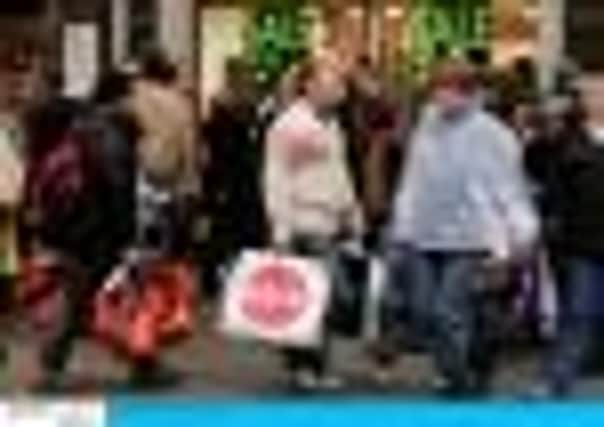Leaders: A glimmer of light amid the high street gloom


Of particular concern for the sector and for the Scottish Government is that consumer confidence in Scotland remains lower than the UK as a whole, with sales falling faster.
It is not hard to discern why. Scotland’s unemployment rate has crept above that for the UK, while average wages are lower, making the squeeze on household spending all the more intense. The figures brought immediate calls from opposition politicians for the SNP administration to drop its proposed retail levy on outlets selling alcohol and tobacco. Such an imposition would not only add to the burdens faced by high street shops but also force many into closure – an outcome which, given the already depressing state of many of our town centres, the Government should be anxious to avoid.
Advertisement
Hide AdAdvertisement
Hide AdOne glimmer of light in the gloom came yesterday with latest figures showing that consumer price inflation fell to 3.6 per cent in January from 4.2 per cent in December, with the headline Retail Price Index down to 3.8 per cent from 4.8 per cent.
The drop largely reflects the benign base effects from the rise in VAT a year ago. Food price inflation edged down to 3.4 per cent in January and is now the lowest since mid 2010. Moreover, inflation is likely to continue to decline rapidly, and fall below the 2 per cent target in about September – assuming no geo-political trauma or a spike in oil prices.
This is the broad forecast on which the latest £50 billion expansion of quantitative easing has been based, taking the total to £325bn. This enormous monetary injection, unprecedented in size and duration, is designed to encourage business investment and expansion and to help the economy to avoid a prolonged deflationary depression.
Concern over the UK’s stuttering growth lay behind the decision by Moody’s to put the UK’s triple-A credit rating on negative watch. It is certainly hard to see where growth will come from. Given the modest scale of pay rises – where pay has been increased at all – most families will struggle for the forseeable future. Remortgaging and a switch to interest-only loans should provide some relief. And the hope is that 2013 will see the beginning of sustained upturn.
But given the need to rebalance the economy towards exports and to reduce reliance on domestic demand, this suggests a prolonged period of retail stagnation at best, and no return to the high street boom of pre-2008, with more shops going under. Internet sales at 8 per cent of the UK total do not materially affect this sombre outlook. However, recent signs of a pick-up in economic activity raise hopes that a formal recession can be avoided.
Moment of truth for Rangers
Craig Whyte, majority owner of Rangers Football Club, appears to have won the first round in a tense legal shoot-out against HMRC in the Court of Session yesterday, securing the appointment of Duff & Phelps, a firm which is already advising it on restructuring, as administrators.
The Revenue contested this unorthodox appointment, insisting an independent administrator be appointed. The move has left it impotent and furious. Given the appalling state of the club’s finances and the overhang of unpaid taxes of at least £47 million, can liquidation now be far behind?
The administrators had to move quickly yesterday to assure Strathclyde Police of payment for covering this week’s fixtures. However, no assurances were given on future games. Rangers now needs to secure a company voluntary arrangement, but agreement here seems unlikely, leaving Whyte the nuclear option of decanting the assets and players into a new “Rangers Mark 2”. This could potentially see the biggest tax swerve in football history, as the tax bill is left with an empty shell.
Advertisement
Hide AdAdvertisement
Hide AdMeanwhile Rangers, now with a tenpoint deduction, face a long overdue moment of truth: a sharp reduction in player wages that will reverberate across the Premier League. Sanity at last? One thing is sure: nothing about this imbroglio will be straightforward.
Long may Mr Sillars provoke debate
Uncompromising. That is the word that best sums up the approach to politics taken by former SNP deputy leader, Jim Sillars. From his time as a Labour MP, through his foundation of the Scottish Labour party to his move to nationalism, Mr Sillars has eschewed political obfuscation. He calls it as he sees it.
In this light we must view Mr Sillars’s description of the First Minister’s backing for a second question, on maximum devolution, in the independence referendum as “fraudulent”. Backing “devo-max” is a fall-back position to keep the SNP in power if it fails to secure sovereignty for Scotland, Mr Sillars claims.
Because of his political perspicacity, we have often agreed with Mr Sillars in these columns. On this issue, however, we beg to differ. In his career in the SNP Alex Salmond has consistently adopted a gradualist approach to independence, arguing his party should move step by step towards its goal. In this context, the First Minister’s position is both reasonably and logical.
If (and it is a big if) “devo-max” can be defined it would be a significant step towards sovereignty though by conceding the Bank of England would oversee sterling as Scotland’s currency, Mr Salmond has blurred the lines between independence and “devo-max”.
Ironically, this is a point Mr Sillars makes when he says the First Minister has been “winging it” on currency and defence policy. In this criticism he is on more solid ground. The more these policies are probed, the less they hold together. Mr Sillars may, in our view, not always be right, but we hope he remains uncompromising. The debate he provokes is good for democracy.